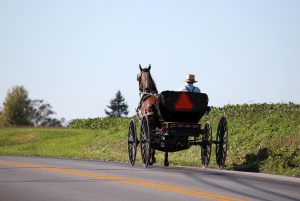Improving access to genetic services for underserved populations: Amish, Mennonite, and other Plain communities
Posted on byLack of access to genetic services in rural areas could contribute to disparities in quality of care, but tailored approaches can overcome some barriers and improve care. Here we present the example of the Midwest Genetics Network (MGN) outreach with the Plain communities.
Plain people are descendants of the Anabaptists who emigrated to the United States from Europe starting in the seventeenth century and include Amish and Mennonites. Plain communities are known for their distinct cultural practices, which include limiting the use of technology, motor vehicles, and electricity. Plain communities have lower use of standard medical care compared with other communities. Plain communities tend to prefer the use of home remedies and herbal supplements over standard Western medical treatments and typically will not seek medical care until absolutely necessary. Furthermore, access to care is constrained by the fact that many Plain people do not utilize public or private insurance and have limited transportation options, often residing in rural areas without nearby specialty care.
Incidence of specific genetic conditions is elevated among Plain communities due to common cultural heritage and population isolation. A large proportion of these genetic conditions affect metabolism pathways and require early medical intervention. Many parents in Plain communities are open to learning about newborn screening, carrier testing, and treatments for metabolic conditions and, as a result, have sought out care within the parameters of their cultural beliefs. For example, while Plain communities don’t usually like to have their pictures taken and don’t typically access the internet, some families have been open to utilizing telehealth if the session is conducted within a clinic, and they are not being recorded. Understanding and respecting these cultural beliefs has been key to successful relationships between this population and geneticists and other providers.
MGN is one of seven Health Resources and Services Administration (HRSA)-funded regional genetics networks charged with improving access to genetics services for underserved populations. MGN has established a Plain Communities Workgroup made up of providers in its seven-state region (Illinois, Indiana, Kentucky, Ohio, Michigan, Minnesota, and Wisconsin). MGN seeks to positively impact health outcomes in Plain communities in several ways:
- Providing networking and learning opportunities for providers. Five clinics that support Plain communities participate and they, along with other clinicians, such as state newborn screening staff and midwives, come together several times a year to share successes and barriers with one another.
- Participating in the Plain Communities Health Consortium (PCHC). PCHC is an association of clinics that serve Plain populations. PCHC organizes collaborative research projects and educational events related to caring for Plain communities, including an annual conference.
- Developing education resources for families. MGN designed a curriculum to help families navigate care for children with special medical needs. The curriculum was created with the input of some Amish mothers who agreed to meet with MGN staff. Topics in the curriculum included Healthcare Fundamentals, Navigating the Healthcare System, Building a Health Partnership, and Advocacy and Support. The training will be piloted with some families at New Leaf Clinic in Ohio and then adapted based on feedback from participants.
- Offering innovation awards. MGN offers small financial awards on an annual basis to organizations who serve Plain communities. Past funded projects include support for the development and dissemination of an Amish newborn screening panel, supporting disease-specific parent/professional meetings, offering transportation stipends for families to attend support groups sponsored by the clinics, and supporting a survey to assess families’ willingness to utilize telehealth, which was delivered through the midwives of the community.
In addition to MGN’s work, certain states with high numbers of Plain people have introduced modified newborn screening algorithms to improve detection of newborns with genetic conditions that are common in these communities. Some states offer free prenatal genetic carrier screening for these conditions, and if both parents test positive, the family is connected to a healthcare provider to discuss recommendations for care upon delivery.
Public health can play a vital role in reducing health inequities and advancing access to care for rural populations such as the Plain communities. Providers who have worked with Plain communities successfully have attributed their success to several factors, most notably awareness and respect of differing cultural practices and beliefs. Building relationships and gaining the trust of communities takes time, but ultimately can result in improved overall health for underserved populations.
Posted on by



